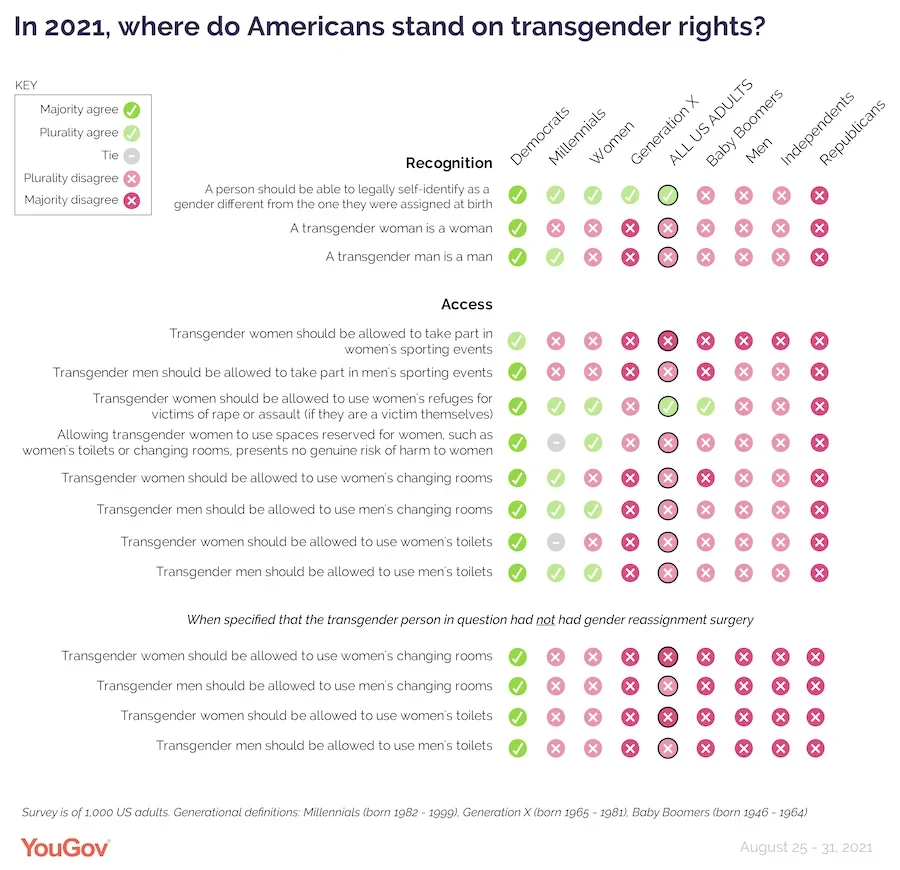A new YouGov survey finds that the American public is divided on transgender rights, including the right for people to legally identify as a gender that is different from the one they were assigned at birth.
Two in five Americans (40%) think a person should be able to legally self-identify as a gender different from the one they were assigned at birth, while just as many (38%) disagree.
According to the National Center for Transgender Equality, most US states – with the exceptions of Tennessee and Ohio – do have a process that allows a person to legally update their identity documents (such as a birth certificate) to reflect their gender.
There are political divides on this question, as well as most other questions on the topic of transgender issues. Two-thirds (67%) of Democrats believe a person should be able to legally self-identify as a gender different from the one they were assigned at birth. Far fewer Independents (33%) and Republicans (17%) share this view, according to a YouGov survey of 1,000 U.S. adults conducted in August 2021.

Women (44%) are more likely than men (35%) to say they believe a person should be able to legally self-identify as a gender different from the one they were assigned at birth. One-third (32%) of women and 44% of men disagree.
Among Millennials, born between 1982 and 1999, 44% believe a person should be able to legally self-identify as a gender different from the one they were assigned at birth. A similar percentage of Generation X (born 1965 – 1981) agrees, at 42%. Baby Boomers (born 1946 – 1964) are less likely to agree, at 36%.
Although many Americans support people having the right to legally self-identify as a gender different from their birth gender, this doesn’t necessarily mean Americans view transgender people as fully belonging to the gender they identify with.
Americans tend to disagree with the statements “A transgender woman is a woman” (37% agree; 46% disagree) and “A transgender man is a man” (38% agree; 44% disagree).
Around half of men (48%) do not believe that a transgender woman is a woman, and 45% say that a transgender man is not a man. Women tend to be more split: 40% say a transgender woman is a woman, while 43% disagree. Similarly, 40% of women agree that a transgender man is a man, while 42% hold the opposite belief.
Among Americans who believe that a person should be able to legally identify as a gender different from the one they were born with, 67% agree that a transgender woman is a woman and a transgender man is a man. But even among this group that supports people self-identifying as a gender different from their birth gender, more than one in five disagree with the statement “a transgender woman is a woman” (23%) and “a transgender man is a man” (21%).
Politically, Democrats are more likely than Independents and Republicans to see transgender people as belonging to their gender identity. But even among Democrats, only about half share this opinion, with the remainder being uncertain or disagreeing.
Among Democrats, half (51%) believe a transgender woman is a woman and a transgender man is a man (52%). Among Republicans, far fewer agree (24% and 23%, respectively). About two-thirds of Republicans disagree that a transgender woman is a woman (68%) and a transgender man is a man (66%).
Americans tend to say transgender men and women should not be able to use the facilities that correspond with their gender identity
Many also take issue with the idea of transgender people using spaces and participating in events meant for people of their gender identity.
This idea of transgender women competing in women’s sporting events has been in the news in recent months thanks to Laurel Hubbard, a transgender weightlifter from New Zealand who competed in the Tokyo Olympics. Just over half of Americans (54%) believe that transgender women should not be allowed to participate in women’s sporting events.
They also tend to say transgender women should not be able to use women’s changing rooms (46%) or restrooms (45%).
Men are more likely than women to hold these beliefs, with 50% of men voicing the opinion that transgender women should not have access to women’s changing rooms or restrooms, and 58% saying they don’t believe transgender women should take part in women’s sporting events.
Among women, 43% don’t think transgender women should be able to use women’s changing rooms and 42% say the same about women’s restrooms. Half (50%) say transgender women should not be able to take part in women’s sporting events.
Three in 10 Americans (29%) think transgender women should be allowed to take part in women’s sporting events. One-third of women (33%) and 25% of men think this should be allowed.
There is less opposition to the idea of transgender women using women’s centers that support victims of rape or assault. About two in five (42%) Americans say transgender women should be able to use these facilities if they are a victim themselves, while 37% disagree. Women (45%) are more likely than men (39%) to say transgender women should be allowed to access these crisis resources.
Men are more likely than women to believe that allowing transgender women into spaces reserved for women, such as restrooms or changing rooms, poses a risk of harm. Men (46%) are 11 percentage points more likely than women (35%) to say that allowing transgender women in these spaces presents a genuine risk of harm to women. Two in five women (39%) don’t agree.
Republicans (62%) are more likely than Independents (41%) and Democrats (23%) to say that allowing transgender women in these spaces presents a genuine risk of harm to women.
When it comes to transgender men in men’s spaces, public opinion tends to be similar to the opinions about transgender women in women’s spaces. About half of Americans (47%) say transgender men should not be allowed to take part in men’s sporting events, while 44% don’t think they should have access to men’s changing rooms. A similar percentage of Americans (42%) don’t think transgender men should be allowed to use men’s restrooms.
It is worth noting that Americans are even less likely to support a transgender person’s being allowed to use the facilities for their gender identity if the person has not had sex reassignment surgery (also called gender confirmation surgery).
Half (51%) of US adults say transgender women should not be able to use women’s changing rooms and women’s restrooms if they have not had sex reassignment surgery. Far fewer (31% for changing rooms, 32% for restrooms) say they should be allowed to do so.
When asked the same question about transgender men being allowed to use men’s changing rooms and restrooms in cases where they have not had gender confirmation surgery, the findings are similar. Half (49%) don’t think transgender men should be able to use men’s changing rooms, and 48% say they shouldn’t be able to use men’s restrooms.
See full toplines and tables here.
Related: Where does the British public stand on transgender rights?
Methodology: 1,000 US adults were surveyed via YouGov from August 25 – 31, 2021. The responding samples are weighted to be representative of the US population.
Image: The Gender Spectrum Collection











